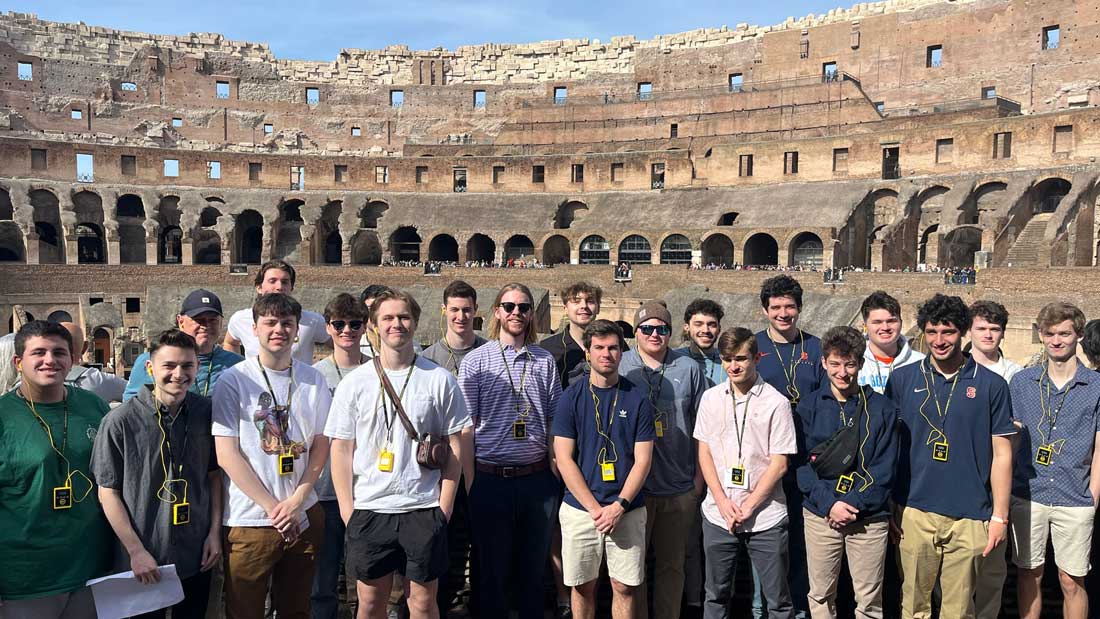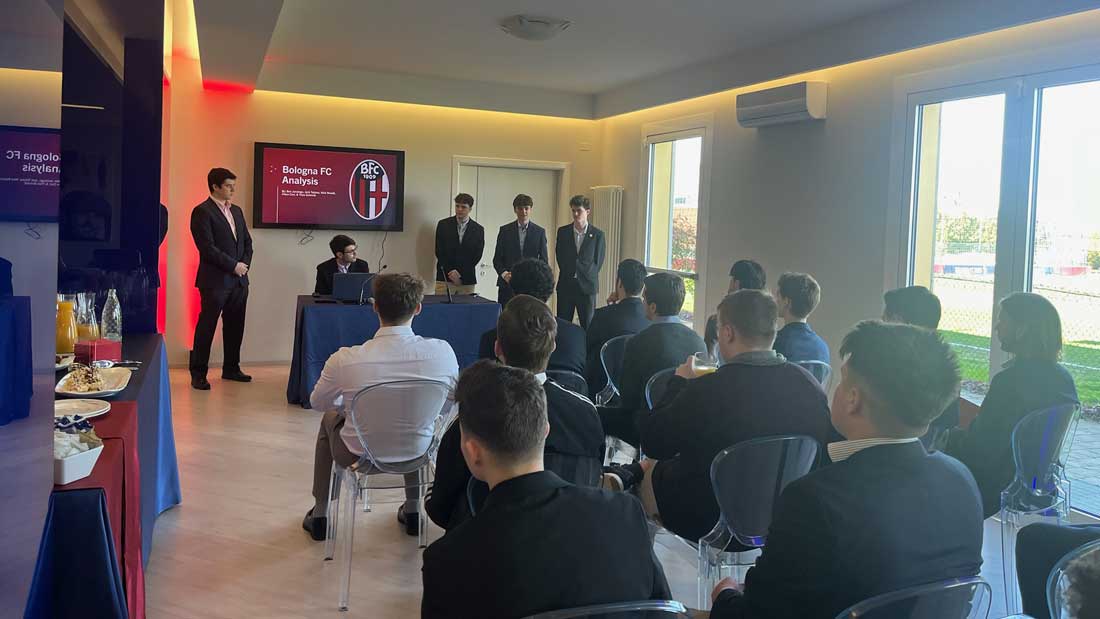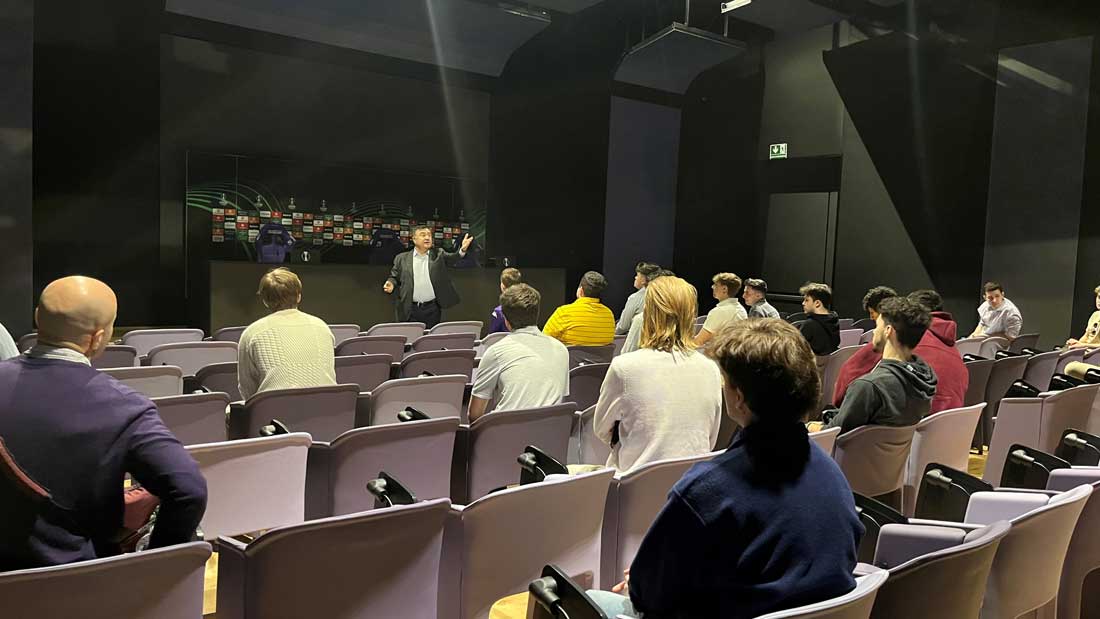
Soccer – or football as it’s known outside the United States – is the world’s most popular sport.
Analytics is the sport industry’s most popular tool as it’s transforming every aspect of the game from player performance and team strategy to fan engagement and business models.
Over spring break, 20 sport analytics majors from Falk College enjoyed a once-in-lifetime opportunity to visit Italy and witness first-hand the impact of analytics on the highest level of soccer. The eight-day trip to Milan, Bologna, Florence, and Rome was part of Department of Sport Management Professor Rodney Paul’s sport analytics course that explores how data is revolutionizing soccer.
“The international experience, in general, is extremely important for our students, but it also gives them a perspective of how analytics are used in different sports at different levels internationally,” says Paul, director of the Sport Analytics program in Falk College. “The students were not merely observers, however, as they actively wrote and presented sport analytics research to the clubs we visited.”
The students met with analytics staff members and other team officials from elite soccer clubs across Italy, while also exploring the culture, history, and food of the ancient European country that’s surrounded by the Mediterranean Sea. As one of the trip’s many highlights, the students attended an Italian Serie A league game between AC Milan and Empoli before more than 70,000 fans at Milan’s San Siro Stadium (AC Milan won 1-0).
The students were accompanied on the trip by Paul, Sport Analytics Program Coordinator Jackie Dorchester G’10, and co-faculty member Ed Lippie, who worked with AS Roma of the Italian Serie league from 2013-20 as a senior performance consultant and head performance coach.
“With our connections we had the privilege of behind-the-scenes access, demonstrating to the students the variety of positions their skill sets match and the opportunities that exist internationally,” Dorchester says. “The value is building on Syracuse University’s Academic Strategic Plan by allowing the students to participate in a study abroad or study away setting, with considerations to their academic goals and financial circumstances.”
Students Jake Graff and Zachary Silverstein say it was fascinating to learn how Italian soccer clubs utilize data compared to sports teams in the United States.
“Clubs with all levels of financial resources and historical success are embracing analytics and finding ways to utilize them in areas that are best for them,” says Graff ’24, a sport analytics major with an information management and technology minor. “Everyone collects and uses data differently, so being able to see numerous perspectives from a league like Serie A was eye-opening.”
Adam Goodman ’25, a sport analytics major with an economics minor, admits he’s not the biggest soccer fan but says it was valuable for his career goals to understand how soccer teams at the highest level approach their analytics.
“I think the main takeaway in terms of my career was the change in the way I think,” Goodman says. “The program allowed me to immerse myself in all aspects of soccer analytics which, going forward, will change the way I approach future research.”

Making the Connections
In her previous position as an academic advisor in the Whitman School of Management at Syracuse University, Dorchester observed the value to students of traveling abroad and learning how different businesses operate. After she started working in the Sport Analytics program in the fall of 2022, Dorchester realized many sport analytics students were accelerating their studies and a semester abroad did not work within their timelines.
At Whitman, Dorchester says the school often used breaks between or during semesters for short-term immersion trips, and she thought the Sport Analytics program could construct a similar trip around Paul’s course because of the industry connections in Italy that had already been formed.
One of those connections is with the Saputo family, including Simone Saputo, who earned his sport management degree from Syracuse in 2021. Joey Saputo, Simone’s father, is chairman of Bologna FC 1909, a member of the Serie A league and one of the teams the students visited on their trip.
“One aspect of this trip that we are particularly proud of is the continued relationship with the members of the Saputo family who continue to provide opportunities that impact our students in the best way possible,” says Sport Analytics Program Manager Francesco Riverso. “We are eternally grateful for this partnership, which also includes a project-based experience that our sport analytics students are currently receiving while working with the Saputo’s other professional team, CF Montréal of Major League Soccer.”
Another key connection was with Lippie, who as co-faculty is a subject expert and has often taught classes within Paul’s course. In his roles with AS Roma, Lippie worked directly with first-team players and helped upgrade training methods and facilities to create an athlete-centric, high-performance culture.
In February 2023, Paul and Riverso contact Lippie about teaching and organizing a unique immersive experience for sport analytics students. The course would include a pre-trip curriculum that exposed the students to how analytics are currently being deployed in the top tiers of European soccer while also preparing them for how to get the most of out the spring break trip.
“My role was to provide the necessary context in the material I taught while sourcing guest lecturers who could speak to how data is being used in three critical areas: roster composition, physical performance enhancement, and match analysis,” says Lippie, whose son, Caden, is a sport analytics major in Falk.
Lippie also tapped his network of former Italian soccer colleagues from AS Roma – some of whom have since moved on to AC Milan – to line up a series of programmatic opportunities in both Milan and Rome.
“In my experience, the best education is achieved by a learn-by-doing approach combined with real-world experiences,” Lippie says. “This course was able to provide both and is another example of how the Sports Analytics program delivers on a unique sports data analytics value proposition that’s preparing the next generation of great sports industry leaders. Each student embraced the experience and exceeded my expectations for what they could learn and how they could apply it.”

When in Rome
When planning the trip, Dorchester made sure to incorporate visits to historical landmarks and other cultural excursions. To schedule those, she contracted with an educational travel company, WorldStrides, and collaborated with an advisor from Syracuse University Abroad.
The students gave the extracurricular visits a “pollice all’insù” – thumbs up in Italian.
“I didn’t realize the sheer amount of beautiful, historic buildings and sights that were just scattered around places like Florence and Rome. It seemed like everywhere I turned, there was a sight worth taking a picture of,” Graff says. “Being able to see sights and experience the culture everywhere we went, as well as experiencing a sport and a field I’m deeply passionate about, made it an incredible experience.”
A surprising highlight for the students and their chaperones was an Italian cooking class, where they made pasta from scratch and then enjoyed the fruits of their labor while dining near the Trevi Fountain in Rome.
“The most enjoyable part of our trip to Italy was sightseeing in each city and the amazing food,” says Silverstein ’26, a sport analytics major with an economics minor. “Every piece of food that I had while in Italy tasted great, and even trying new foods that I never thought I would enjoy was simply fantastic. Also, the sights and historical places we visited were breathtaking – the Vatican, Roman Colosseum, Michelangelo’s Statue of David, and so much more.”
Dorchester and Paul say the Sport Analytics program, with the support of the Department of Sport Management and Falk College, is committed to offering the course again in Spring 2025 with the eventual goal of expanding the opportunity to sport management students and traveling to other countries to observe and learn about sport and its global impact.
“I would tell any student who has an inkling of applying to this program to do it. Simply put, this was one of the best experiences of my life and I’m very happy I took this once-in-a-lifetime opportunity to venture to Italy,” Silverstein says. “If you like soccer or not, any person who thinks they might want to go on this trip should apply because you’ll have a great time and appreciate Italy and soccer more.”
Goodman says students who make this trip in the future should know that the team officials are just as interest in learning about the students’ experiences as the students are interested in learning about the teams. These shared experiences and connections will help students as they pursue their professional careers, and perhaps some of them will end up working for soccer teams in Italy.
“I was surprised at how prepared I am coming from this program,” Goodman says. “This program provided a unique opportunity to tour teams and see first-hand the work done by analytics departments, and being able to compare that to what we work on at Syracuse in and out of class was very eye-opening.”
